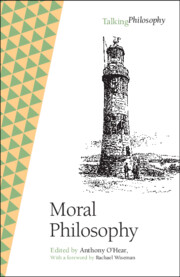Book contents
- Moral Philosophy
- Talking Philosophy
- Moral Philosophy
- Copyright page
- Contents
- Foreword
- Preface
- List of Contributors
- Rationality and Goodness
- Acting well
- Apprehending Human Form
- Does Modern Moral Philosophy Rest on a Mistake?
- Absolutes and Particulars
- On the So-called Logic of Practical Inference
- Absolute Prohibitions without Divine Promises
- Moral Obligation
- The Lesser Evil
- The Ethics of Co-operation in Wrongdoing
- Authority
- The Force of Numbers
- Reason, Intention, and Choice
- Modern Moral Philosophy and the Problem of Relevant Descriptions
- Index
- References
Does Modern Moral Philosophy Rest on a Mistake?
Published online by Cambridge University Press: 19 May 2022
- Moral Philosophy
- Talking Philosophy
- Moral Philosophy
- Copyright page
- Contents
- Foreword
- Preface
- List of Contributors
- Rationality and Goodness
- Acting well
- Apprehending Human Form
- Does Modern Moral Philosophy Rest on a Mistake?
- Absolutes and Particulars
- On the So-called Logic of Practical Inference
- Absolute Prohibitions without Divine Promises
- Moral Obligation
- The Lesser Evil
- The Ethics of Co-operation in Wrongdoing
- Authority
- The Force of Numbers
- Reason, Intention, and Choice
- Modern Moral Philosophy and the Problem of Relevant Descriptions
- Index
- References
Summary
Someone once told me that the average number of readers of a philosophy article is about six. That is a particularly depressing thought when one takes into account the huge influence of certain articles. When I think of, say, Gettier’s article on knowledge, or Quine’s ‘Two Dogmas’, I begin to wonder whether anyone is ever likely to read anything I write. Usually the arguments of these very influential articles have been subjected to widespread analysis and interpretation. The case of Elizabeth Anscombe’s ‘Modern Moral Philosophy’, published in 1958, is something of an exception.1 That article has played a significant part in the development of so-called ‘virtue ethics’, which has burgeoned over the last three decades in particular. But there has been less close attention to its arguments than one might have expected.2
- Type
- Chapter
- Information
- Moral Philosophy , pp. 118 - 146Publisher: Cambridge University PressPrint publication year: 2022

